After the first 12 miles, the bike trail petered out and we turned onto the shoulder of a four-lane highway. Heading west, the graceful porches of old Florida gave way to gated developments, which turned into double-wides with chattery corrugated roofs. Cars in the yard, dishes on the trailers. My mother and me. We pedaled the gritty edge, single file, gripped tight against the vacuum of semitrucks rushing past.
We spooled past the chicken shack and Dollar General in Clermont and then Route 50 stretched out lonely through the slash pine forest, dense and wild in the way that makes you feel skinless and alone, like the swamp on either side could swallow you up.
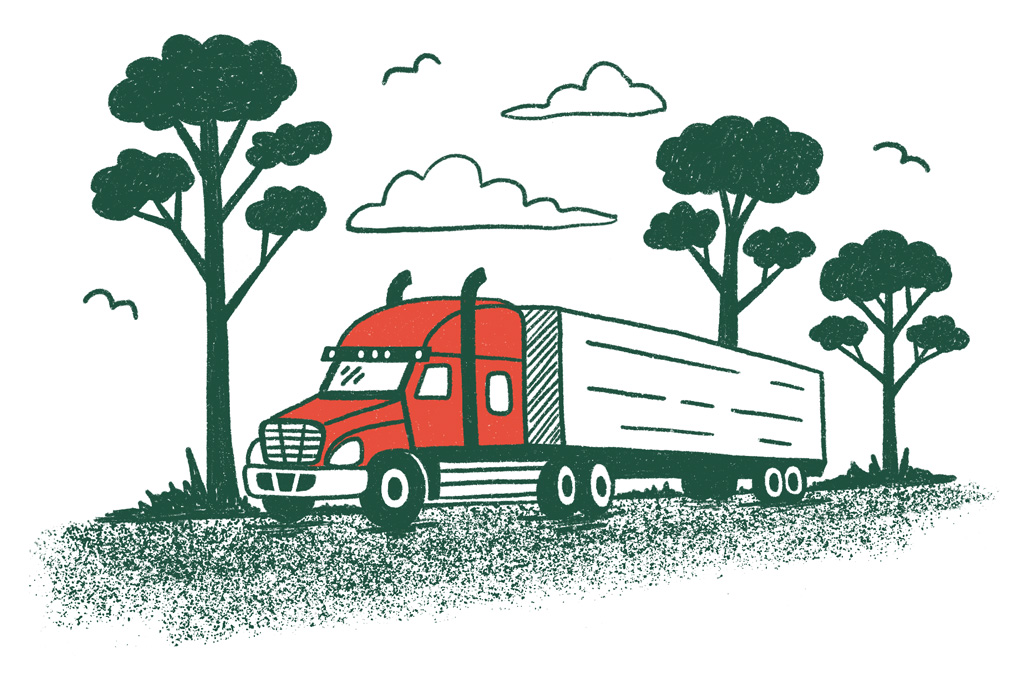
Our cross-state bike adventure in February of 2018 was not panning out as planned. We’d imagined quiet trails and bonding time, an adventure to shake out our demons. But by lunch on the second day we were exhausted by the thrum of the highway. We couldn’t talk to each other, and we were strung tight the whole time. A low grey sky hung above a Styrofoam scrim of takeout containers, and microscale buff mountains of fire ant hives. Everything felt a little threatening.
And then my mother fell head first into traffic.
The internet had promised us a bike route. The Coast-to-Coast Trail: 250 miles from the Atlantic Ocean to St. Petersburg that we thought would take us five days. From her computer in Boston, my mother had found an outfitter that would rent us bikes in Orlando, and then shuttle them back for us, and a Google map outline of the route, which traced across the skinny middle of the state.
We wanted a goal. We both felt like we needed a bike ride to feel more like ourselves.
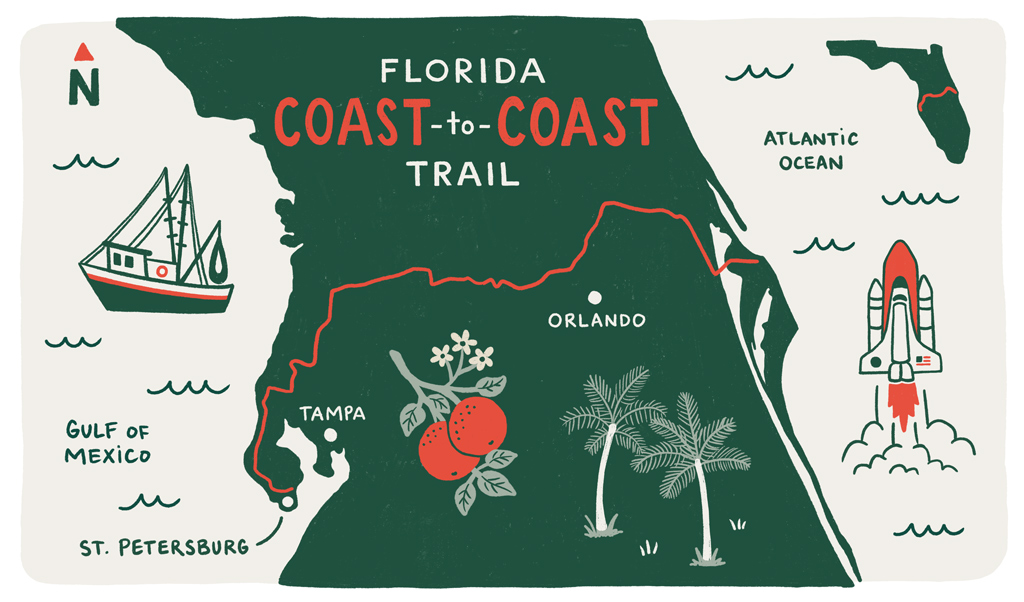
The winter before, after years of limping through soccer games and half-stepping through hikes, my mother finally had her hip replaced, and she was trying to figure out her new joint’s ability and how far she could push herself. Biking seemed like the way to ease herself back into hard physical activity.
The fall before, I’d had my shoulder surgically put back together for the second time. While it healed, I slipped under a wave of anxiety that had been pulling me out from the shore of stability for months. A stalled work project, another failed relationship, the current state of the world, and the slow drowning of depression that comes from all of that and none of that, amplified by the cyclical flail of knowing that you’re your own problem, but that you can’t quite help yourself. I spun to nowhere on the bike trainer and spent weeks walking frantic laps through my Seattle neighborhood, trying to fight the self-loathing. The intertwined pain of anxiety and depression, to which I’m prone, set in heavy and hard.
My treatment for anxiety has always been motion. I beat back preteen angst at the bottom of the basement swimming pool in the YMCA, returning chlorine-pruned and exhausted but spiraling less. As I got older, I learned to lace up my running shoes to try to head off the crush of angst in my chest. But exercise hits a tricky point between medicine and pressure—it’s not always enough. This time, endorphins did nothing. Adrenaline was just a coursing thud that wouldn’t let me sleep.
My mother knew I wasn’t OK but asking how to help is hard within our stiff-lipped New England family, so she’d offered up the trip as a balm. My grandfather’s 91st birthday was coming up; we should go see him on the Gulf Coast. We could bike there from Orlando. She wanted to see how far she could go. The ride was her way of trying to regrasp her physical ability—more gracefully than I was—and to give me a goal. In my fog, I was grateful. I figured even something a little purposeful might help pull me back from the spiral and I wouldn’t have pushed myself to do it alone. I didn’t feel worthy of a solo trip, but she gave me a reason, even if it was an invented one.
With citalopram newly coursing through my bloodstream, and my shoulder healed enough that I figured I could hold on to handlebars for a bunch of mom-paced hours a day, we went.
She flew down from Boston and I flew out from the West Coast. I took a late rideshare to the hotel where she was already sleeping and tried not to wake her up when I tucked myself into bed beside her.
In the morning, we realized we might be in for more than we planned. “St. Pete, huh?” The guy at the bike rental kiosk said, after telling us the best bike trail he knew of went 25 miles in the wrong direction, and he wasn’t sure of any others. “Guess I’ll see you this weekend,” he said, skeptically, as we made shuttle plans. A shockingly quick Google in the bike shop revealed that the coast-to-coast bike trail was still in the planning phase. The gut clench of self-loathing came back. I should have double-checked. We shouldn’t be doing this. I can never do anything right.
But we wanted the chance to spin out over unfamiliar territory together. And we had already come this far.
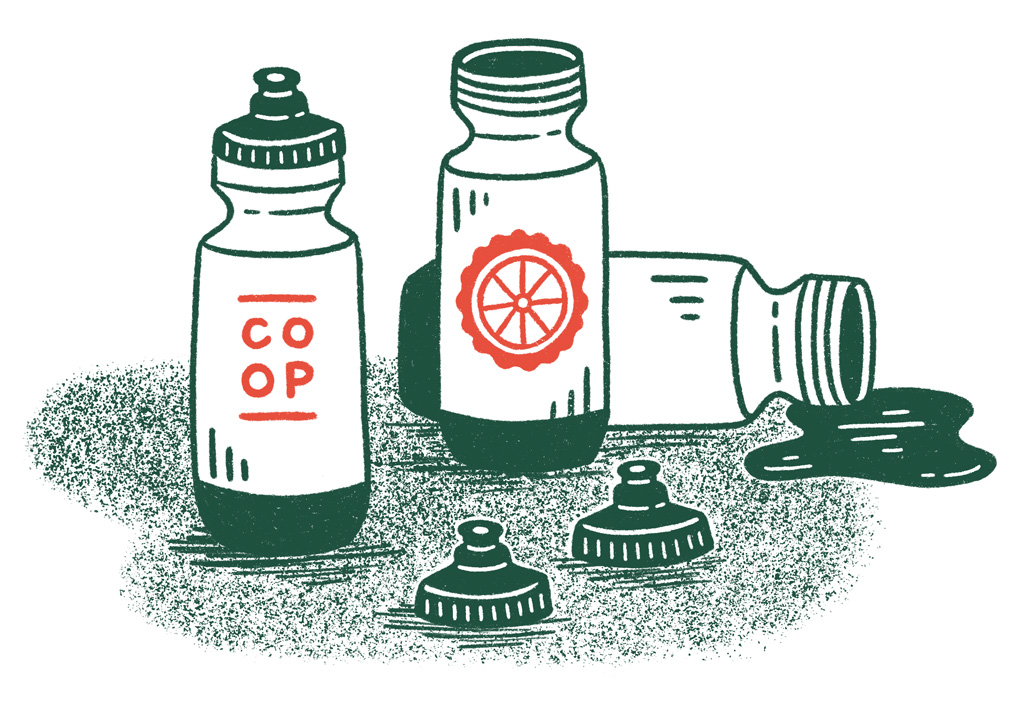
Stubbornness is my best and worst quality. It’s the inherited desire to push into something new, and the weird genetics of being happiest somewhere in the pain zone of type two fun (miserable in the moment, fun in retrospect). So, we filled our water bottles and rode west, trying to keep smiling. Telling ourselves it was an adventure as our vision of a smooth bike trail disintegrated and the highway plowed through rotting orange groves. I had pictured swampy Everglades full of lush plants and unknown animals; instead we saw Confederate flags and snarly chained-up dogs. We were spinning as fast as we could through the exurbs of nowhere. Nothing scenic, no drivers expecting bikes, just us on the edge of the road, trying to beat down miles. I was frustrated and stressed and the whole thing felt pointless.
When she fell, her head tipped toward the pavement first, helmet smacking, knees scraped raw and road-rashed. She was bleeding immediately, and as she lay there, split-second stunned, sprawled in the right-hand lane, my slow-firing reflexes sparked back up, and I irrationally threw myself into the street behind her, so the semis would hit me first. I was shaken out of my own head for a second, more worried about her than me. Time stretched in the seconds it took her to move again.
One of the things I struggle with when I fight back anxiety and depression is feeling inadequate, and like I can’t manage to take care of myself in the simplest way. The irrational internal pressure takes over my brain circuits. But sometimes, tenderness and rawness are the same. When I moved to wanting to take care of my mom, I stopped sulking. I stepped into taking charge. I felt like I could take care of her, at least, like I had some kind of power. Even if I would have really been powerless against an oncoming vehicle.
We got back on the road, tender, achy and cautious. Our necks cricked and our confidence shaky, we rode as far over on the shoulder as we could. The sky felt heavy and too close. In the next town, we stopped to buy bandages and sandwiches, and take some deep breaths.
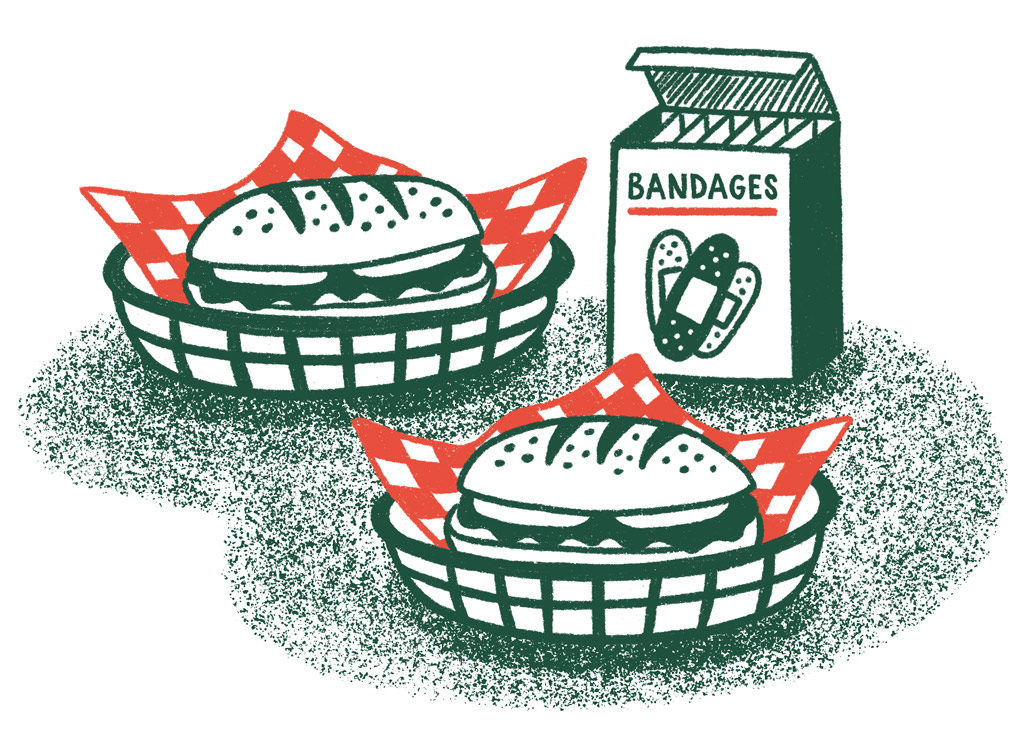
A big bike trip, or any kind of trip that involves arduous, repetitive, physical motion, is a battle between your body and your brain. You have to find ways to tune out the aches and work through them. You have to distract yourself, but not too much. You can’t let your mind spiral out into self-destruction. Don’t think too much, but don’t stop thinking, either. Sometimes the only thing to do is to narrow the focus, to think about one thing, instead of all of the things. On the bike trip, that became true. I broke down the goals: All we have to do is get to Tarpon Springs, all we have to do is get to Brooksville. In cutting it down, we could just concentrate and pay attention. We could put our normal day-to-day stresses on hold while we pedaled through the palmettos and pitch pines, past the shelled out fruit fields and former plantation homes.
I rode in back, keeping a watchful eye on my mom’s small frame gripped tight over her handlebars, glancing back over my shoulder to see what was coming up behind us. I felt protective and purposeful in a way I hadn’t in a long time, like I was the grownup and there was a reason for me to be there—I had to be the tough one holding it together.
When she got nervous, I tried to be brave. I tried to take care. When we got tired, I started singing songs. We yelled over the roar of cars about old memories. When the traffic was light enough that we could hear each other, we rode close and reminisced about other trips. Sometimes the sky opened into clear blue, and light patched through the scrubby forest. We stopped for a snack at a former orange grove, reading the historic plaques, trying to imagine what it must have been like when the rows of trees were full.
There are all kinds of studies about how time spent outside and physical activity can benefit our mental health. And there are plenty of heavy-handed sports metaphors that elide the way that is true: perseverance, or the power of teamwork, or learning that you’re stronger than you think. Those are all both correct and not that easy. You can’t just power through depression on fresh air and endorphins, and expect to feel amazing. It’s not enough to change your brain chemistry. But human connection, time and a plan can help create the feeling of caring and being cared for that feels so far away when you’re deep in the shit. Motion isn’t everything, but it’s something.
On the last afternoon, we ducked off the highway into a tree-lined county park. Its quiet path—albeit cracked and gritty—offered a reprieve from the highway. We stopped at a trailside pond, watching birds, trying to guess the names of the flower that grew along the water’s edge. For a little while in the swampy Florida landscape, it felt like we were in the kind of place I had been thinking about when we decided to go: the wetlands teeming with life, the cypress so thick we could barely see through. That afternoon, reality and my vision of an adventure overlapped, even though it was just for a little bit.
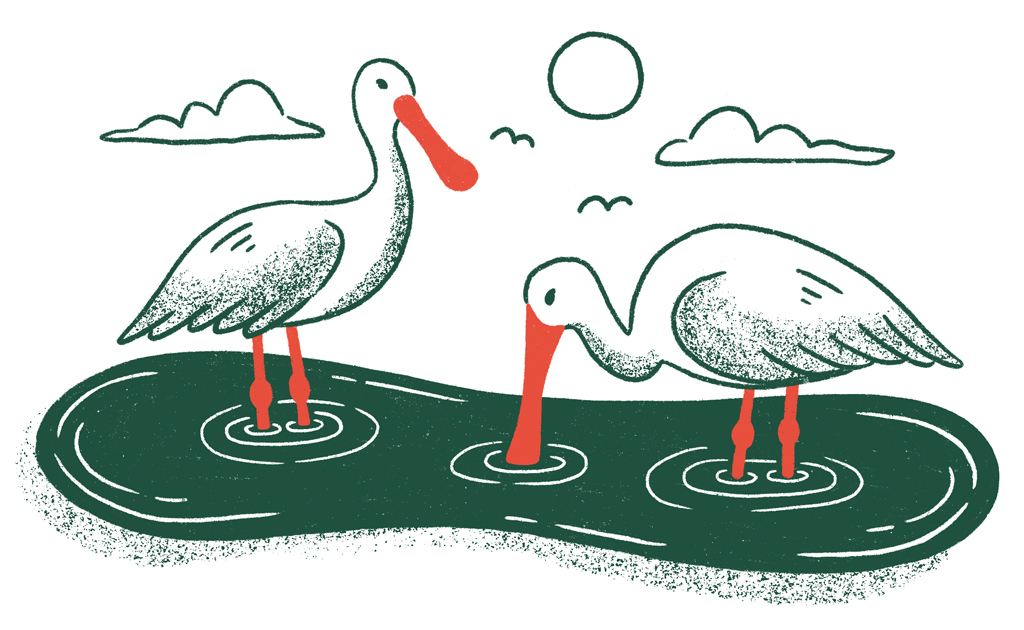
It wasn’t what we had planned. Of course it wasn’t what we had planned. You can’t stop the falls before they happen. You can’t fix everything. You break down, you try to be brave. You keep pedaling.
Things don’t change in an instant, but then sometimes they do. At some point you pick your head up, and you can see the shimmer of the Gulf Coast in the distance. The semitrucks stop rushing by quite so close, and spinning your wheels comes with a sense of accomplishment, instead of a sense of fear. It’s not all ache, sometimes it’s a glide.
We spent our last few miles on the urban bike trails of St. Petersburg, which were flat, even and traffic free—almost too easy, after the stress of the highway. Our bones hurt, and we were ready to be done. But we also felt like we’d finally figured out our rhythm and found the goodness in the toughness. “Maybe a smaller state, next time,” my mom said, as we spun into the industrial district of the city, looking for a burrito and the place where we were supposed to meet the guy from the bike shop. “There should be a next time. Do you think we could do Idaho?”
Illustrations by Emily Irelan
